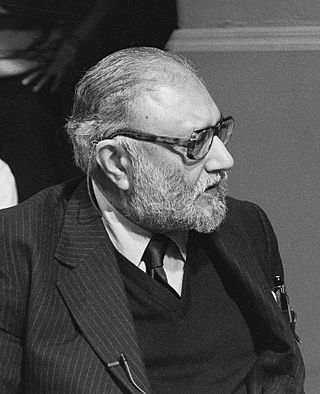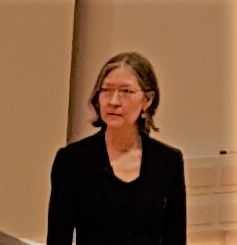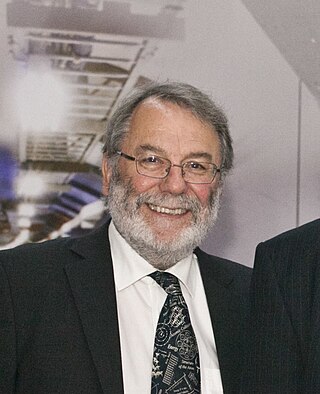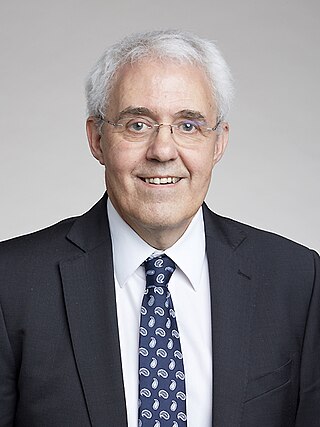Related Research Articles

Mohammad Abdus Salam was a Pakistani theoretical physicist and a Nobel Prize laureate. He shared the 1979 Nobel Prize in Physics with Sheldon Glashow and Steven Weinberg for his contribution to the electroweak unification theory. He was the first Pakistani and the first Muslim from an Islamic country to receive a Nobel Prize in science and the second from an Islamic country to receive any Nobel Prize, after Anwar Sadat of Egypt.

Cecilia Payne-Gaposchkin was a British-born American astronomer and astrophysicist who proposed in her 1925 doctoral thesis that stars were composed primarily of hydrogen and helium. Her groundbreaking conclusion was initially rejected because it contradicted the scientific wisdom of the time, which held that there were no significant elemental differences between the Sun and Earth. Independent observations eventually proved she was correct. Her work on the nature of variable stars was foundational to modern astrophysics.
Steve, Steven or Stephen Schwartz may refer to:
Eric Ronald Priest is Emeritus Professor at St Andrews University, where he previously held the Gregory Chair of Mathematics and a Bishop Wardlaw Professorship.

Helen Fay Dowker is a British physicist who is a current professor of theoretical physics at Imperial College London.

Sir Peter Leonard Knight is a British physicist, professor of quantum optics and senior research investigator at Imperial College London, and principal of the Kavli Royal Society International Centre. He is a leading academic in the field of quantum optics and is the recipient of several major awards including the Royal Medal from the Royal Society and the Thomas Young Medal and Prize from the Institute of Physics. He is a former president of the Institute of Physics and the Optical Society of America, the first non North American-based person to take the position.
Andrew Christopher Fabian is a British astronomer and astrophysicist. He was Director of the Institute of Astronomy, University of Cambridge from 2013 to 2018. He was a Royal Society Research Professor at the Institute of Astronomy, Cambridge from 1982 to 2013, and Vice-Master of Darwin College, Cambridge from 1997 to 2012. He served as president of the Royal Astronomical Society from May 2008 through to 2010.

Joanna Dorothy Haigh is a British physicist and academic. Before her retirement in 2019 she was Professor of Atmospheric Physics at Imperial College London, and co-director of the Grantham Institute – Climate Change and Environment. She served as head of the department of physics at Imperial College London. She is a Fellow of the Royal Society (FRS), and a served as president of the Royal Meteorological Society.

Margaret Ebunoluwa Aderin-Pocock is a British space scientist and science educator. She is an honorary research associate of University College London's Department of Physics and Astronomy, and has been the chancellor of the University of Leicester since February 2023. Since February 2014, she has co-presented the long-running astronomy television programme The Sky at Night with Chris Lintott. In 2020 she was awarded the Institute of Physics William Thomson, Lord Kelvin Medal and Prize for her public engagement in physics. She is the first black woman to win a gold medal in the Physics News Award and she served as the president of the British Science Association from 2021 to 2022.

David John Southwood is a British space scientist who holds the post of Senior Research Investigator at Imperial College London. He was the President of the Royal Astronomical Society from 2012–2014, and earlier served as the Director of Science and Robotic Exploration at the European Space Agency (2001–2011). Southwood's research interests have been in solar–terrestrial physics and planetary science, particularly magnetospheres. He built the magnetic field instrument for the Cassini Saturn orbiter.

Molly Morag Stevens is Professor of Biomedical Materials and regenerative medicine and Research Director for Biomedical Materials Sciences in the Institute of Biomedical Engineering at Imperial College London.
Yvonne Elsworth FRS FInstP FRAS is an Irish physicist, Professor of Helioseismology and Poynting Professor of Physics in the School of Physics and Astronomy at the University of Birmingham. Elsworth was until 2015 also the Head of the Birmingham Solar Oscillations Network (BiSON), the longest running helioseismology network with data covering well over three solar cycles.
David Marshall is Professor of Physical Oceanography at the University of Oxford and a Fellow of St Hugh's College, Oxford.
The Richard Glazebrook Medal and Prize is awarded annually by the Institute of Physics to recognise leadership in the field of physics. It was established in 1966 and named in honour of Sir Richard T. Glazebrook, the first president of the Institute of Physics. It was originally a silver medal with a £250 prize.
Giles Harrison is a Professor of Atmospheric Physics in the Department of Meteorology at the University of Reading, where he has served as Head of Department several times. He is a Visiting Professor at the Universities of Bath and Oxford. His research work continues over 250 years of UK studies in atmospheric electricity, in its modern form an interdisciplinary topic at the intersection of aerosol and cloud physics, solar-climate and internal-climate interactions, scientific sensor development and the retrieval of quantitative data from historical sources.

Anthony Raymond Bell is a British physicist. He is a professor of physics at the University of Oxford and the Rutherford Appleton Laboratory. He is a senior research fellow at Somerville College, Oxford.
Peter Norreys is professor of inertial fusion science at the University of Oxford and is an Individual Merit Fellow of the Science and Technology Facilities Council.
Marina Galand is an atmospheric physicist and lecturer at Imperial College London. She is the 2018 recipient of the Holweck Prize for her "outstanding contribution to space physics by studying in a comprehensive and original manner the effects of energy sources on planetary atmospheres throughout the Solar System and beyond".

Stanley William Herbert Cowley is a British physicist, emeritus Professor of Solar Planetary Physics at the University of Leicester.
The Institute of Physics awards numerous prizes to acknowledge contributions to physics research, education and applications. It also offers smaller specific subject-group prizes, such as for PhD thesis submissions.
References
- 1 2 RAS Announces Geophysics Medal Winners for 2006
- 1 2 3 Curriculum Vitae of Steven Jay Schwartz
- ↑ Imperial College Space and Atmospheric Physics Group webpage
- ↑ "2017 Cecelia Payne-Gaposchkin Medal and Prize". Institute of Physics. Retrieved 26 December 2019.
- ↑ Steven J Schwartz - Personal webpage